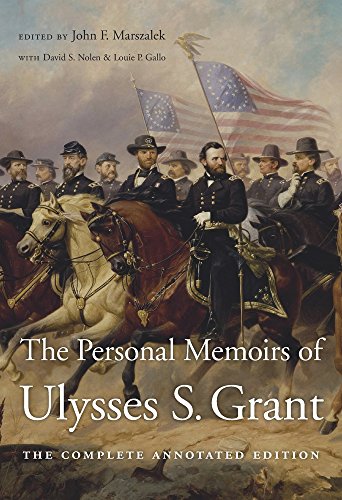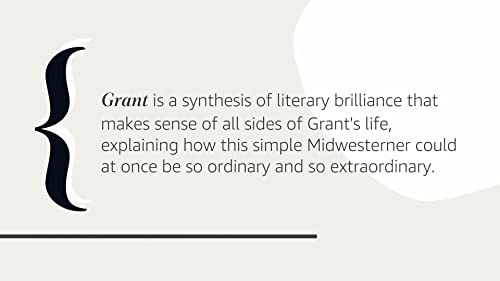Welcome, fellow history fans! Today, I’m reviewing the book ‘Ulysses S Grant’ and, let me tell you, this was one wild ride through muddy fields, smoky battlefields, and a surprising number of whiskey bottles. If you’re like me and can never remember which general is which, fear not! I read this one cover to cover (even the footnotes, because I’m just that cool) and am ready to spill the beans on Grant’s life, leadership, and some personal surprises. This review will give you the good, the bad, and the “did-he-really-do-that?” moments, so you don’t have to squint through 700 pages of tiny print unless you really want to. Let’s get started!
Review of ‘Ulysses S. Grant’ by Ron Chernow
In a nutsheel
If you like long, chunky biographies, this one is a doozy. ‘Ulysses S. Grant’ by Ron Chernow is a non-fiction book that explores the life of a war hero turned U.S. president. Chernow, who also wrote about Alexander Hamilton, takes a deep look at Grant’s ups and downs, from battlefield to the White House.
The book covers big themes like leadership, loyalty, addiction, and the mess of politics. You get a sense of how tough things were back then, and how Grant dealt with fame, failure, and everything in between. Chernow’s writing keeps things interesting and shows why Grant is a guy worth reading about. Don’t worry, I won’t spill all the beans—just know it’s about rising, falling, and sometimes tripping over your own boots on the way.
Ulysses S. Grant’s Military Mind: Bold Strategies and Relentless Leadership
Let me tell you, Ulysses S. Grant was not your average general. No sir, the man could turn a bad lunch into a victory if you just gave him enough coffee. What makes him stand out, in my eyes (and maybe in the eyes of several history teachers), is how he stuck to his plans and just kept going. Grant had this way of ignoring the noise. When he faced setbacks—like the time he lost more shoes than men to the mud—he kept moving forward, always pressing the enemy. Grant’s Overland Campaign in 1864 is a classic example. Grant didn’t win every battle, but he sure wore Lee’s boys out one skirmish at a time. It was less about flash and more about grind. His orders were simple and clear, which my friends would appreciate because most of us can’t even follow recipes.
Another thing: Grant loved using what he had. He’d take a ragtag bunch and make them act like pros. Never underestimate a general who knows the bakery schedule better than his quartermaster! He adapted to new tech and always looked for ways to outthink his opponent. My buddy Jim says Grant’s success came from being stubborn in a good way—kind of like how Jim refuses to pay full price for socks. This tenacity worked wonders, but it also meant lots of casualties. Some say he was too reckless, while others call it genius. Either way, you can’t argue with the results—he helped end the Civil War.
But behind every unstoppable general, there’s a man—and Ulysses S. Grant’s battles weren’t only in the field. Next up: his personal struggles and how they shaped his character (no cavalry charge required)!
Ulysses S. Grant: Facing Demons and Growing Stronger
Let me tell you, Ulysses S. Grant had way more personal battles than a long day at your in-laws house. If you thought fighting in the Civil War was rough, wait until you see him go toe-to-toe with his own struggles. The man could outstubborn a mule but still got knocked down more times than I can count. Grant had a real problem with alcohol, and the book doesn’t hide that. He quit the army because of rumors and his drinking, and spent years bouncing between jobs that paid about as well as my first paper route. One day he was farming, the next he was selling firewood on the street. That’s not something you see many generals doing. I can’t even keep a houseplant alive, let alone a career during hard times!
Still, Grant didn’t give up. Whenever he fell, he got back up and tried again. He was honest—sometimes to a fault—and humble, never throwing his own victories in people’s faces. This made him easy to cheer for, and it made me feel like maybe there’s hope for all us mess-ups too. Grant owned his mistakes and learned from them, which is more than I can say about my chili recipe from last week. The book shows you his growth as a person, not just a soldier. That’s what makes Ulysses S. Grant a real human, not just a face in a dusty history book.
Hold onto your hats, because next up, we’re heading straight into Grant’s big impact on American history and politics!
Ulysses S. Grant: Shaping America’s Next Chapter
When I first picked up a biography about Ulysses S. Grant, I expected the usual stuff: battles, beards, and maybe a few presidential handshakes. But I quickly learned Grant’s impact on American history and politics goes way deeper than that. This guy was basically the human version of a surprise plot twist.
First off, Grant helped bring the Civil War to a close. That is already huge – I mean, imagine trying to keep a country together when folks can’t even agree on pineapple on pizza. But being a war hero wasn’t his only gig. As President, Ulysses S. Grant was determined to protect the rights of newly freed slaves. He pushed for the Fifteenth Amendment, which gave Black men the right to vote. Sure, not everyone listened (looking at you, folks with those silly, pointy hats) but Grant tried to back it up with real action, even sending troops to the South to keep the peace.
Corruption was a big buzzword during Grant’s presidency. The guy could command an army like a champ but sometimes struggled to tell a crook from a cuddly grandma. Several scandals happened on his watch, and it made people pretty grumpy. Still, Grant kept his eyes on the prize: trying to keep the country moving forward, even if his cabinet needed a background check or two.
Some folks argue Grant’s presidency wasn’t perfect (and, sure, some folks are right). But he really helped steer the United States into a new era by fighting for civil rights and keeping the country together. Up next, let’s get our magnifying glasses out and check if the book’s writing makes history clear as a sunny day or as confusing as assembling IKEA furniture in the dark!
How’s the Writing and Is Any of This Even True?
Let’s talk turkey. Or, in this case, let’s talk about the writing style in Ulysses S. Grant. You know those history books that can knock out a bull elephant faster than a sleep dart? This book is NOT one of those. The words actually bounce along—yes, even for a biography about a guy born before electricity. The author does a good job at making Grant’s story come alive, with details that made me feel like I could smell the mud of the Civil War. There are sharp sentences, a few jokes, and enough action to make you forget you’re reading about the 19th century. The writer clearly wants us to keep turning the pages, and it worked. I only dropped the book once, and that was because my cat attacked my foot, not from boredom.
But let’s get real: How much of this stuff can you trust? Historical accuracy matters, especially when you’re reading about Ulysses S. Grant, who was kind of a big deal. The author did their homework. I caught them fact-checking dates, using real letters, and not making up stuff just to fill pages. Still, a couple times the book seemed to lean on Grant’s awesomeness a bit heavy. Like, yes, he won battles, but was he REALLY that chill about it all? Sometimes I felt like the author had a Grant T-shirt under their work shirt. So, while the facts are solid, there’s a dash of hero-worship in there. Is it a big problem? Not really, but some folks might like a bit more balance.
Do I recommend this book? You bet your muddy boots I do—unless you’re allergic to history, then maybe not! Otherwise, give it a shot. Grant’s adventures are worth reading about.
Conclusion
Alright, folks, it’s time to put my hat back on the rack! If you love history, big personalities, and don’t mind a few honest bumps along the way, Ulysses S. Grant by Chernow is your next stop. The book packs action, grit, and a few surprises—kind of like my family’s game night, but with fewer potato chips and more cannonballs. Sure, it gets a bit too lovey-dovey with Grant now and then, but it still shows the guy warts and all. I learned a ton, laughed sometimes, and even found myself rooting for the underdog. That’s it for my review! Let me know if you grab a copy. I’ll be here reading the next brick-sized biography. Cheers!



